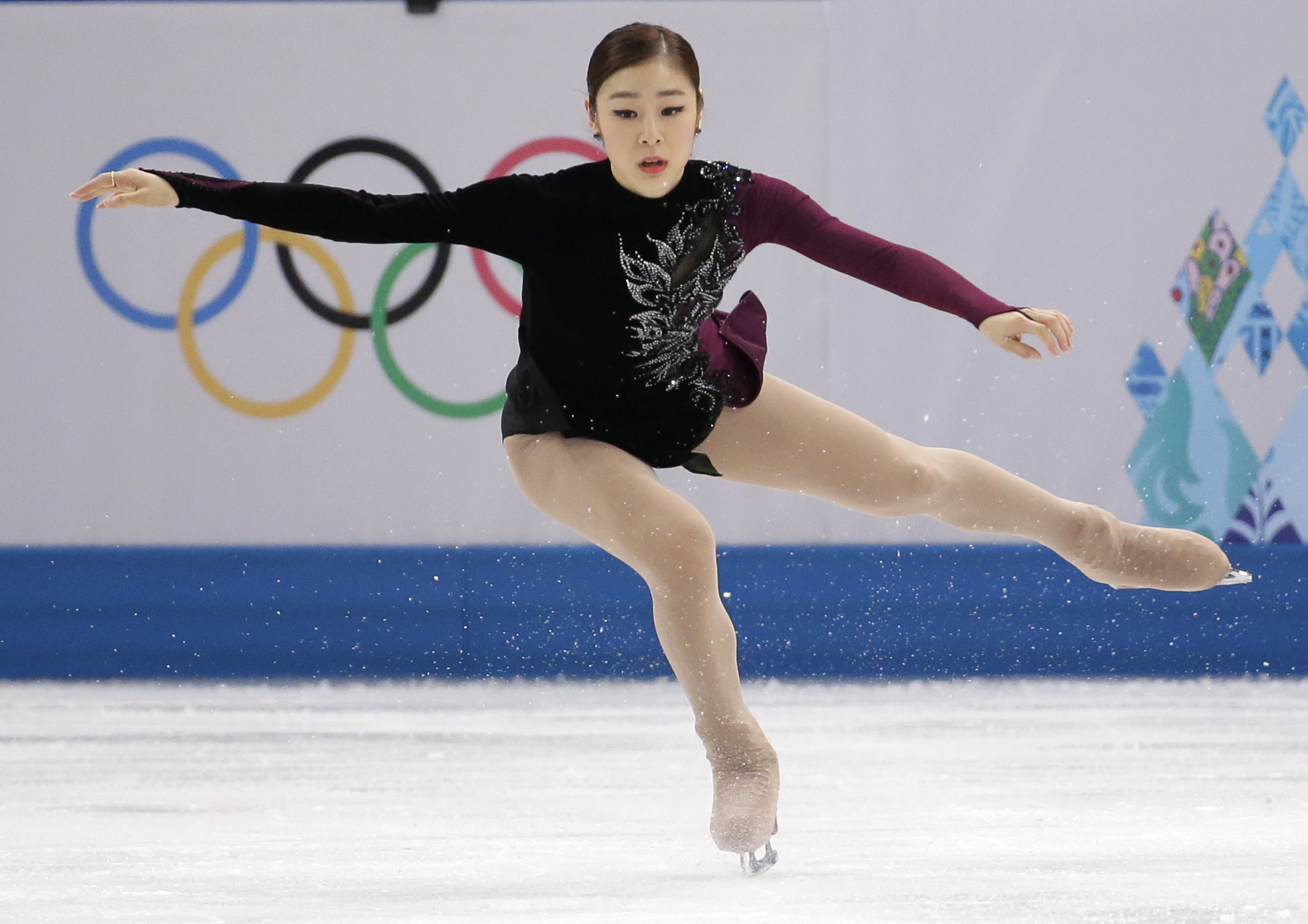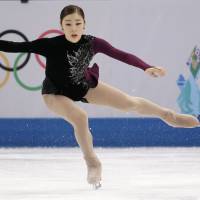Could Yuna Kim be awarded the Olympic gold medal from the Sochi Games after all?
Given the shocking evidence produced this week in the World Anti-Doping Agency's McLaren Report, it is a fair question.
Just to review, Russia's Adelina Sotnikova was awarded the gold on home ice in Sochi on Feb. 20, 2014, in great controversy over defending champion Kim of South Korea. Ice Time was in the Iceberg Skating Palace that night, and like many observers in attendance, felt something just wasn't right.
In a column the following day, I wrote, "Kim could not have gotten out of the Iceberg Skating Palace with the gold medal if she had left with it in an armored car."
Little did I know at the time how true that statement may have been.
The results of the investigation by Prof. Richard McLaren, a Canadian attorney, for WADA revealed state-sponsored doping on an absolutely phenomenal level. McLaren listed his key findings precisely as the following:
1. The Moscow Laboratory operated, for the protection of doped Russian athletes, within a State-dictated failsafe system, described in the report as the Disappearing Positive Methodology.
2. The Sochi Laboratory operated a unique sample swapping methodology to enable doped Russian athletes to compete at the Games.
3. The Ministry of Sport directed, controlled and oversaw the manipulation of athlete's analytical results or sample swapping, with the active participation and assistance of the FSB (Federal Security Service), CSP (Center of Sports Preparation), and both Moscow and Sochi Laboratories.
The whistleblower on the Russian scheme was Dr. Grigory Rodchenkov, the former director of the country's anti-doping lab. He first made the allegations in an interview with The New York Times in May, which prompted WADA to take action.
The results the probe produced are absolutely mindblowing. During the Sochi Games the report says that urine samples for Russian athletes were swapped out nightly, actually passed through a hole in the wall in a clandestine move to avoid detection, and replaced with clean urine of other athletes that was then manipulated by Rodchenkov to make them appear like it was from the Russian athletes.
In the original New York Times story, Rodchenkov indicated that "at least 15 medal winners were part of a state-run doping program . . ."
Russia won the medal standings in Sochi with a total of 33, and 13 golds, including Sotnikova's.
The Times article said the doping "involved some of Russia's biggest stars of the Games . . ."
Now there has been nothing produced to this point to indicate that Sotnikova was part of the doping program.
But who is to say?
She could have even been given performance-enhancers unknowingly.
If you think it is preposterous to even pose the possibility of Sotnikova having benefited from the hijinks that have been uncovered, you probably thought there was no way that four-time Grand Slam champion Maria Sharapova could ever be found to have been doping.
We have gone into the looking glass in this matter, where black is white, and white is black. Anything is and was possible.
According to the McLaren Report, "Specific athletes were identified and placed on a State Program list for protection of samples given during the Sochi Games. Athletes on this list would have the urine in their Sochi samples replaced with any clean urine supplied by them in advance of the Sochi Games which was stored in the freezer of the FSB building near the Sochi Laboratory. So long as the swap occurred, the athlete would be protected from a positive test for any PEDs they were taking."
The IOC reacted with outrage to the findings of the McLaren Report and issued a terse statement on Tuesday that said no stone would be left unturned to get to the bottom of the Sochi scandal.
"The IOC will initiate reanalysis, including forensic analysis, and a full inquiry into all Russian athletes who participated in the Olympic Winter Games Sochi 2014 and their coaches, officials and support staff," read one section of the statement. "For this purpose, a specific Disciplinary Commission is set up under the chairmanship of Mr. Denis Oswald. Following the report of this Commission, the IOC EB (Executive Board) will impose all the appropriate sanctions."
The statement makes it quite clear the IOC will overturn results from Sochi if it has to.
Sotnikova was not completely unknown heading into Sochi. She was a four-time Russian champion and the 2011 world junior champion.
But in her three seasons skating on the senior circuit, she had never even won a Grand Prix event, much less medaled at a major international competition.
She had qualified just once for the world championships as a senior, finishing ninth in 2013. To this day she remains the only Olympic gold medalist in women's skating never to have previously medaled at a world championships or Olympics.
It seems to me, that in light of the massive scale of the doping plot in Sochi, that all of the Russian medalists should be provisionally stripped of their medals and other medalists upgraded.
Many might say that this would be unfair, a sort of guilt by association. But in this instance, because the Russian sports machine was apparently involved in perpetrating this incredible fraud on the Olympic Games, I'm afraid it is guilty until proven innocent, not the other way around.
Sotnikova may well be a victim of nothing but bad luck and having benefited from shameful judging, but the storm clouds are forming quickly here.
Yuna might just yet end up with that second gold medal and join Norway's Sonja Henie and Germany's Katarina Witt as the only women ever to retain the Olympic title.
It would be more than ironic if the IOC, which looked the other way on the judging controversy in Sochi, ended up righting a wrong well after the fact.
Interesting possibility: Might Japan play host to a second Grand Prix event during the upcoming season?
Don't rule it out, because of the IOC's orders after the fallout from the McLaren Report. Included in the IOC's statement on the findings was the following:
"Because of the detailed references to the manipulation of samples during the Olympic Winter Games Sochi 2014 the IOC asks all International Olympic Winter Sports Federations to freeze their preparations for major events in Russia, such as World Championships, World Cups or other major international competitions under their responsibility, and to actively look for alternative organizers."
This means that if this provisional order stands, the ISU will have to move the Cup of Russia, slated to be held in Moscow (Nov. 4-6), to another country.
Japan would seem a logical choice. With time running short, and Sapporo already scheduled to host the NHK Trophy (Nov. 25-27) this season, there is no question that Tokyo or Saitama could host a second GP.
How about a capacity crowd of 18,000 fans in Saitama Stadium three nights in a row?
Think that might be music to the ears of the ISU and Japan Skating Federation?
Ice Time says bring it on.
It would create a lot of work for many people, but as legendary skating writer Phil Hersh has pointed out on multiple occasions, Japan is single-handedly keeping the sport alive.
As it stands now, world champion Javier Fernandez has been assigned the Cup of Russia along with Shoma Uno and Keiji Tanaka.
Kanako Murakami and Yura Matsuda are in the women's field and are set to compete against Russia's Julia Lipnitskaia, Anna Pogorilaya and Elena Radionova.
With the Cup of Russia scheduled to be third of the six-event GP series and the NHK Trophy the last, the spacing would work out nicely with a three-week break in between the two.




